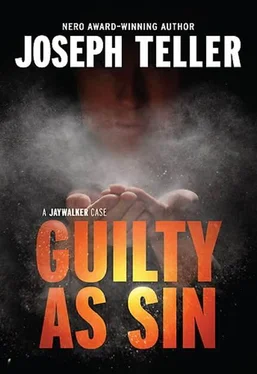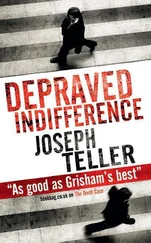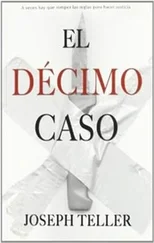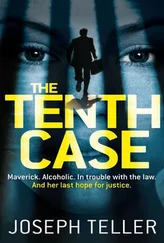Joseph Teller - Guilty As Sin
Здесь есть возможность читать онлайн «Joseph Teller - Guilty As Sin» весь текст электронной книги совершенно бесплатно (целиком полную версию без сокращений). В некоторых случаях можно слушать аудио, скачать через торрент в формате fb2 и присутствует краткое содержание. Жанр: Криминальный детектив, на английском языке. Описание произведения, (предисловие) а так же отзывы посетителей доступны на портале библиотеки ЛибКат.
- Название:Guilty As Sin
- Автор:
- Жанр:
- Год:неизвестен
- ISBN:нет данных
- Рейтинг книги:5 / 5. Голосов: 1
-
Избранное:Добавить в избранное
- Отзывы:
-
Ваша оценка:
- 100
- 1
- 2
- 3
- 4
- 5
Guilty As Sin: краткое содержание, описание и аннотация
Предлагаем к чтению аннотацию, описание, краткое содержание или предисловие (зависит от того, что написал сам автор книги «Guilty As Sin»). Если вы не нашли необходимую информацию о книге — напишите в комментариях, мы постараемся отыскать её.
Guilty As Sin — читать онлайн бесплатно полную книгу (весь текст) целиком
Ниже представлен текст книги, разбитый по страницам. Система сохранения места последней прочитанной страницы, позволяет с удобством читать онлайн бесплатно книгу «Guilty As Sin», без необходимости каждый раз заново искать на чём Вы остановились. Поставьте закладку, и сможете в любой момент перейти на страницу, на которой закончили чтение.
Интервал:
Закладка:
Put that together with the forcible rape of a child charge, and Green Haven had a new arrival who might as well have had a bull’s-eye painted on his back.
“Prison is a lot like the street,” Barnett explained. “Only it’s, like, concentrated. Out on the street, the strong gang up together and prey on the weak. But the weak have choices, at least. They can split. They can move out of the neighborhood. They can lock themselves indoors. And they can complain to the police. Inside, you don’t have options like that. You can’t move out just because you don’t like the neighborhood. You can lock down in your cell, but only for so long. When it’s mealtime, you got to come out and go to the mess hall. When it’s rec hour, you got to go to the yard. You got a job-you got to go to work. As for the police, there are none. There are the COs, the corrections officers. But a lot of them are down with the gang members, and most of the others find it’s easier to look away when trouble starts. And trouble is always starting.”
“So what do you do?” Jaywalker asked, even though he pretty much knew the answer.
“You find safety in numbers,” Barnett told him. “You join up with the Bloods or the Kings if you’re Latino, or the Aryans if you’re white. Me, I’m black. I joined up with the Muslims. I converted to Islam.”
Jaywalker nodded. In the 1970s, it made sense. Today, in a post-9/11 world, it would have set off alarm bells. But back then, even if you didn’t happen to be a big fan of Malcolm X, hearing that someone was a Muslim didn’t automatically make him a terrorist.
“And how did that work out?” Jaywalker wanted to know.
“Not so well,” said Barnett. “At first, the brothers thought I was a plant, a snitch. Between the rape charge and the school-grounds thing, they figured I was looking to join up so I could spy on them and rat them out.”
“To whom?”
Barnett laughed. “Funny, that’s what I asked. But I never did get an answer. All I got was a contract put out on me, a price on my head. So I did the only thing I could. I found me a protector.”
Jaywalker said nothing, but his stare must have said enough.
“No,” said Barnett, “not the way you’re thinking. I didn’t become somebody’s bitch, or anything like that. When I say I found a protector, I simply mean I allowed myself to be taken under the wing of an older con, a guy who’d been there long enough to have established a rep for himself. Someone the brothers trusted.” Jaywalker nodded.
“His name was Hightower. Clarence Hightower. He ran the prison barbershop, where the inmates went to get haircuts. He saw I was having a real hard time, and he’d heard about the contract on me. And for some reason he could tell I wasn’t a snitch. So one day he offered me a job cutting hair. I told him I didn’t know the first thing about it. He laughed and said, ‘You think I did when I started? I was an enforcer for a numbers ring. All I knew was how to crack skulls and break kneecaps. You’ll learn.’
“Still, I’d been in enough joints to know that, inside, nothing comes free. Nothing. So I ask him what it was going to cost me. I figured he’d tell me smokes or candy or commissary money, stuff like that. Instead he looks at me and asks what people called me on the outside. ‘AB,’ I tell him. He says, ‘AB, what I’m doing for you is called a favor. Understand? It’s the kinda thing you can’t put a price tag on. But who knows. One day I may need me a favor myself. You just remember that, okay?’ And I said ‘Okay.’”
“And that was it?” Jaywalker asked.
“And that was it. I knew it might come home to haunt me someday,” said Barnett. “But the way I looked at it, I had no choice. It was only a matter of how long it was going to take before I got a knife stuck into my gut or a razor pulled across my throat. Compared to owing a man a favor? What kind of choice was that?”
“Not much of one,” Jaywalker had to admit.
Assigned to the barbershop, Barnett spent the first month sweeping up, sorting towels and linens, and keeping track of scissors, combs and Afro picks, which even though they were all plastic and round-tipped, had to be turned in each evening. There were no razors allowed in the shop. And bit by bit, simply by virtue of working for Clarence Hightower, Barnett managed to shed his reputation as a child rapist, school-yard drug dealer and snitch. And though no official word ever came down that the contract on him had been lifted, a time came when he felt safe. Safe being a relative word in prison, of course. After three months Hightower let Barnett start cutting hair himself, under his watchful eye. Before a year was up, he was an accomplished barber, at least to the extent one can become an accomplished barber with instruments designed for preschoolers.
Barnett was doing a four-and-a-half-to-nine at Green Haven, and he made parole on his second try, after five years. He’d lined up a bed in a halfway house and a job washing dishes in a restaurant, the New York Department of State having informed him that despite the qualifications spelled out in his written request, his felony convictions disqualified him from obtaining a barber’s license. In his plan for parole, he’d listed among his goals reestablishing contact with his daughters and eventually getting them back from foster care.
His parole officer told him to get real.
Still, by the time of his release Barnett had won the trust of the brothers, earned his GED and kicked his heroin habit for good. He hadn’t realized it at the time he’d signed up, but practicing Muslims didn’t do drugs, drink alcohol, smoke cigarettes or curse their god. Had the Koran only thought to prohibit flying airplanes into buildings, it might be a different world we live in today. But this was 1981, a full two decades before that particular loss of innocence.
On the day of Barnett’s release, Clarence Hightower was the last one in line to high-five him and wish him success on the outside. Hightower himself was doing a ten-to-twenty bit for aggravated assault and wouldn’t be getting out for another three years. There was no mention of favors done or favors owed.
There’d be time for that later.
Barnett and Jaywalker were interrupted by a corrections officer, an old-timer known to Jaywalker by face, though not by name. Which was no surprise. Jaywalker had always been good at faces, while names and phone numbers eluded him. So the exchange of greetings became something of a guy thing.
“Hello, Counselor.”
“Hey, big guy. Howya doon?”
Big Guy reached one hand through the bars and handed Barnett a couple of sandwiches wrapped in paper, and a cardboard cup. Then, without asking, he did the same for Jaywalker. The COs all knew Jaywalker, knew he spent more time in the pens talking with his clients than all the other lawyers combined. Knew he worked straight through the lunch hour. And knew he never turned down a day-old cheese sandwich or a lukewarm cup of something that passed for coffee. They considered him one of their own, and they looked after him and, by extension, his clients.
“Thank you,” Barnett and Jaywalker said as one.
“You got it,” said Big Guy, moving on to the next pen.
They ate in silence for a few minutes, lawyer and defendant, separated by a dozen thick iron bars and the fact that one of them would be going home when the visit was over, while the other was already home, in a manner of speaking.
“So,” said Jaywalker once they’d finished eating, “what happened next?”
As he always did, Barnett waited a few seconds before answering. And this time he took additional time to count on his fingers-backward, it would turn out. “Summer of 1984,” he said after a while. “I’ve been out three years. Drug free. Have an apartment to call my own. Not much to brag about, but still…I’m working as a grill man at a different restaurant, a better one. Got visitation with my daughters. Haven’t missed a single reporting date with my parole officer. Life is good.”
Читать дальшеИнтервал:
Закладка:
Похожие книги на «Guilty As Sin»
Представляем Вашему вниманию похожие книги на «Guilty As Sin» списком для выбора. Мы отобрали схожую по названию и смыслу литературу в надежде предоставить читателям больше вариантов отыскать новые, интересные, ещё непрочитанные произведения.
Обсуждение, отзывы о книге «Guilty As Sin» и просто собственные мнения читателей. Оставьте ваши комментарии, напишите, что Вы думаете о произведении, его смысле или главных героях. Укажите что конкретно понравилось, а что нет, и почему Вы так считаете.












